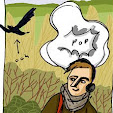I've spoken before about my love of municipal building supplies newsletters (fruit of a period of time I shared a name and city with someone in the business who got me onto lots of mailing lists), but for sheer excellent read-this-during-the apocalypse, which-apocalypse?, doesn't-matter-just-pick-one value, nothing beats my newsletter subscription to the the Centre for the Study of Existential Risk (CSER).
I don't know how I got subscribed to them. Maybe I knew someone working there for a while (it's in one of the home town constellation cities) or maybe I saw a news story; maybe I took part in a survey or some online research. I am, after all, apocalypse-interested. In case you're unclear about what they, do, they are an interdisciplinary research centre dedicated to the study and mitigation of existential risks, and in case that is not clear enough for you, they are in the business of the study and mitigation of risks that could lead to human extinction or civilisational collapse.
They're often quite focussed on AI, but this month the CSER newsletter has linked through to a big list of 313 potential non-medical methods for reducing transmission of Covid. Some of these are very bleak:
I don't know how I got subscribed to them. Maybe I knew someone working there for a while (it's in one of the home town constellation cities) or maybe I saw a news story; maybe I took part in a survey or some online research. I am, after all, apocalypse-interested. In case you're unclear about what they, do, they are an interdisciplinary research centre dedicated to the study and mitigation of existential risks, and in case that is not clear enough for you, they are in the business of the study and mitigation of risks that could lead to human extinction or civilisational collapse.
They're often quite focussed on AI, but this month the CSER newsletter has linked through to a big list of 313 potential non-medical methods for reducing transmission of Covid. Some of these are very bleak:
- Discourage unnecessary speaking when people are in close contact.
- Constrain ‘long’ connections between people in different social groups who seldom or rarely interact.
- Split and separate teams doing key work in case one team gets infected.
- Design system so doors automatically shut once numbers exceed a given threshold as detected by phone signals.
- Individuals queue online and are told when their turn is to leave house, office or desk for e.g. doctor’s appointment or lunch.
- Encourage or enforce walking clockwise around shared spaces.
- Eat at own desk where possible.
But others are intriguing and imaginative, narrowing in on the CSER's central premise; that the fear of impending apocalypse is a great motivator for creative problem solving.
- Create convention that different people touch different areas of objects, for example design refuse bins so collectors touch different areas from householders (e.g. centre element of handle red and marked “do not touch” or designed with separate handle)
- Store items that could be contaminated (e.g. shopping bags) so the one stored longest is taken first.
There are also a few in the can't-believe-this-isn't in-place-already area such as:
- Encourage or require people to stop spitting in public places.
But lock-down traffic silence means that the sound of people spitting is carrying quite a way, and I can confirm that I have regularly heard people spitting in public places during the pandemic, and I really wish that they wouldn't. We have no "No spitting" signs in the UK as local social convention prohibits spitting in any case, but maybe we need to come up with some wording?
"We appreciate that you would never under normal circumstances consider spitting in public, but should you find yourself in a position where this is impossible and you absolutely have to spit (for example while jogging, or as a result of hayfever) make sure you carry a suitable receptacle and dispose of it in safely, your household rubbish."
Reassuringly, the rest of the CSER newsletter is the same tone as usual; how to make AI "trustworthy", biosecurity issues, alternative food production (algae!) to reduce carbon footprint, antibiotic resistance, and generalist doomsday pathogens.
Sounds intriguing? Sign up here.




No comments:
Post a Comment